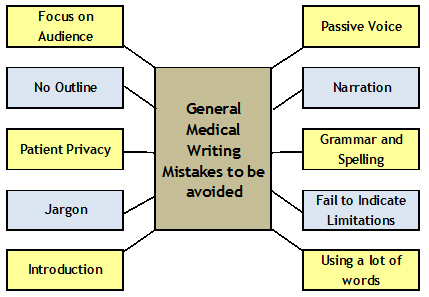Medical Writing involves creating all-around detailed Scientific Research reports that include Medical Trials, material for medical care, health magazines, diaries, and news.

What are the Mistakes in Medical Writing for Clinical Research?
Focus on Audience
It’s crucial to figure out how much your reader knows about such medical topics. Writing with your target audience in mind will ensure that your content is both engaging and informative.
No Outline
You have an idea of what thoughts, observations, or facts you want to add, but your mind is disorganized. Outlining is a simple solution. This will give you structure and ensure that your thoughts flow in a logical order. An outline will save you from forgetting anything crucial that might detract from the persuasiveness of your claim. Finally, outlining ensures that you use the appropriate format.
Patient Privacy
One of the most egregious failures in the writing mistakes made by medical researchers is failing to protect patient privacy. The very essence of medical research writing is to protect the privacy of patients. Breach of privacy is not only unethical; it is also a serious legal offense that is punishable severely.
Jargon
Jargon is common in drug-related content and other content that addresses a specific product, but it can be perplexing to readers who are unfamiliar with it. You’ll need to determine your readers’ existing knowledge of the subject and settle on suitable terminology. Explain concepts the first time they appear in the text, if possible. If abbreviations are more succinct, spell them out the first time they appear, followed by the abbreviation in parentheses. Long, complicated terms that require your readers to consult a dictionary only serve to make your content less available.
Introduction
The introduction of any long-form material is crucial. It’s doubtful that your readers will read any more if you don’t catch their attention right away. Remember that just because the topic is science doesn’t mean the presentation has to be dry. Get right to the point of your introduction. You must convince the audience that the text is worth reading. Keep the introduction brief, avoid any subjective detail, and stick to the facts only. An introduction usually accounts for around 10% of the total text.
Passive Voice
It is not necessary to use Passive voice as it may be confusing to the Readers. Switching Tenses inappropriately may confuse the Readers.
Narration
When writing a research paper, case study, or essay, it’s important to avoid using the first-person narrative. It’s crucial to stay consistent with your narrative viewpoint in the piece, regardless of which one you choose.
Grammar and Spelling
Inconsistent use of terms Capitalization, Spelling, and Acronyms.
Fail to Indicate Limitations
Focusing only on the positive aspects of a report makes medical research biased. Although focusing solely on the positive aspects can make the research writer happy, it undermines the central essence of medical research writing: objectivity.
Using a lot of words
Using a lot of words works well in literature, but in medical writing, it’s more important to be concise and precise than to use a lot of words. It is more important to get right to the point than to be too imaginative with vocabulary.
Conclusion
The above mistakes should be avoided while writing Medical Writing for Clinical Research.


